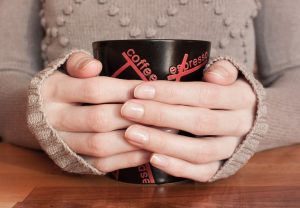How Safe is Caffeine?

April 21, 2017 by Elaine Walker in News
Caffeine is a popular drug in many countries of the world – but how safe is it?
I recently came across an interesting WA Government Health Dept. fact sheet in my library of information which is dated December 1988. There were concerns about the long term effects of caffeine when taken in excessive amounts and it was clearly written that “were the drug to be introduced today (meaning 1988), it would be available only on prescription.” That’s a strong, bold statement.
Many years ago when studying for my degree in psychology, I relied on caffeine to keep me focused and alert as I ploughed through research papers, books, everything and anything as I chased that ‘A’ grade pass mark. Tea, coffee and cocoa cola was all part of my daily diet. The ‘warning bells’ were ringing loud and clear but I wasn’t listening. It was only when I ventured into a new class on Health Psychology one year at the beginning of Semester 1 that the brain cells ‘joined the dots’ and I had my answers. Whoa! So that’s why my stomach was so upset some days, it’s the caffeine drinks I was having. Easily fixed I thought, I’ll just stop drinking the caffeine laden drinks and the stomach will settle down.
I was so determined to take back control and live a healthier lifestyle but I was in for a rude shock. I developed a king sized headache that lasted 3 days. I hadn’t yet learnt just how powerful a drug caffeine is and coming off caffeine so drastically was not the wisest decision I’ve ever made. But I learnt from that.

Caffeine in Coffee – Be careful how much you drink
I learnt that if I had withdrawn from caffeine slowly, simply by reducing the number of glasses of coke or cups of tea or coffee over a few weeks, I would probably have saved myself from the pain of the withdrawal symptoms. Yes, I learnt to respect drugs and their powerful effect on the brain and body.
A Stimulant Drug
Caffeine is a mild stimulant drug which affects brain and body and is considered to be quite addictive. We can find caffeine in everyday beverages such as tea, coffee, cola and in products such as ice cream, energy drinks and chocolate.
Effects of Caffeine
Several factors will determine the effects of caffeine such as:
- how much you have
- whether you are also eating food,
- how often you drink or eat something with caffeine in it,
- your height, your weight, even your mood.
I’ve heard many people refer to their morning cuppa as a ‘heart starter’, and this is an accurate description of just what this powerful drug can do. Our heart does start to beat faster and we can feel more awake and ready to start our day. Did you also know that your body temperature can rise, you may go to the toilet more to urinate and the stomach starts to produce more acid.
Common Problems of Large Amounts of Caffeine
Sleeplessness is very common, also feelings of restlessness, nervousness and even hand tremors are symptoms that need to be listened to. Lack of sleep (often called sleep deprivation) can cause chronic tiredness that can affect the ability to think clearly, affect mood and contribute to depression. If you are not sleeping soundly every night or you are feeling stressed, anxious, depressed, and generally struggling through the day, your long term health could be affected.
The Importance of Seeing a Therapist
Do You Know When You Are Becoming Angry?
Caffeine can often be used as a way of trying to cope with the stresses and strains of everyday life yet in some people even a small amount of caffeine can increase their symptoms of stress and anxiety. Finding a better natural way to deal with any day – day problems is how I can help. I offer a FREE Personal Telephone Consultation to help you decide whether you prefer a Counselling process or would like to experience Hypnotherapy; quite often a combination of both approaches can help.
How Much Caffeine is a Safe Amount
Health reports vary, some say no more than 400 mg of caffeine per day, others say no more than 600mg per day. When visiting outside coffee bars be aware that their coffee could be much stronger than the instant coffee you are used to at home which generally averages 60-80 mg per cup. Constantly in the health news, pregnant women are advised to reduce their caffeine intake.
For more information on caffeine check out
Contact Me today, my name is Elaine Walker and I am an experienced and qualified Clinical Hypnotherapist and Specialist Counsellor.
Call Me today for your FREE Personal Telephone Consultation 9300 6026 and I will be happy to assist you.
Health and Happiness to you.
Search
Services
- Abuse (Domestic Violence)
- Addictions
- Anger Management
- Childhood Issues
- Depression
- Divorce and Separation
- Fears & Phobias
- Grief and Loss
- Habits to Health
- Pain Management
- Parent/Teen Conflict
- Parenting Issues
- Quit Smoking
- Relationship Problems
- Reduce/Quit Alcohol
- Stress-Friend or Foe
- Sleep Problems (Insomnia)
- Self Confidence & Self Esteem
- Stress & Anxiety
- VGB Weightloss
- Weight Problems
Recent Posts
April 21, 2017
December 27, 2016
December 27, 2016
December 27, 2016






